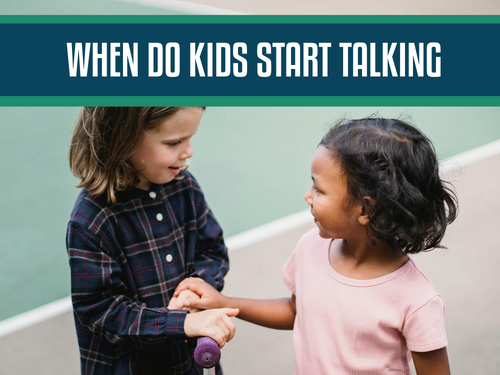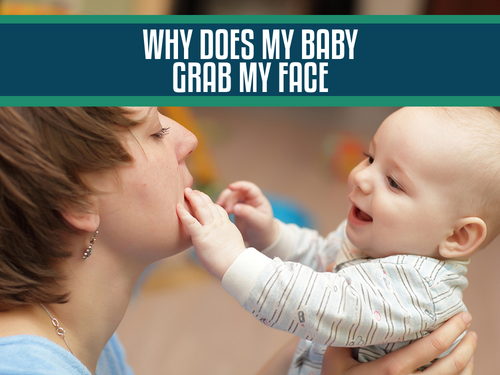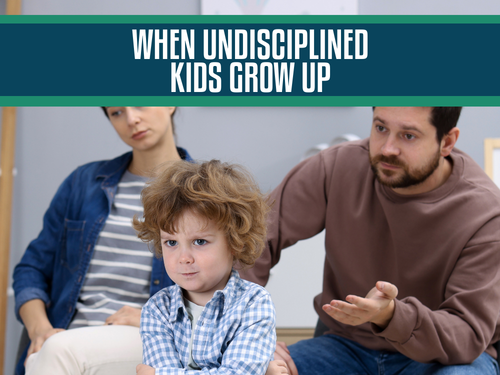When Do Babies Start Talking? Milestones & Tips for their First Words

Yes—finger plays, clapping games, and dance routines that use hand gestures all help. Combine rhythm and repetition for deeper learning.
Send home simple activity ideas, kits, or worksheets. Offer short instructions and encourage family involvement. Regular practice builds lasting progress.
Try origami, sticker scenes, stringing pasta, or painting with Q-tips. Crafts that use small pieces build precision and control.
Even before a baby says their first word, they are absorbing language from the world around them. From birth, babies listen closely to voices, tone, and rhythm. This early listening builds the foundation for speech development.
Babies can understand familiar sounds before they can say words themselves. For example, a baby may recognize their name, look when you say “milk,” or respond when you call “bye-bye” long before they’re capable of actually talking. This shows that understanding language comes first, and speaking follows later.
*<H3>*The connection between talk and early language skills
Long before babies say their first word, they go through several steps of practice. At around 6 months of age, they’ll start to babble, experimenting with repeated sounds like “ba-ba” or “da-da.” While it might seem like playful noise, this is actually a critical milestone. It’s how babies train their mouths, tongues, and brains to coordinate speech.
This stage of baby talk is also how babies begin learning conversation patterns. They notice that when they “talk,” parents respond, which teaches them that sounds can get attention and even meaning. Over time, these babbles transition into clear sounds, then simple words, and finally full sentences.
Encouraging this process is simple: talk to your baby often, respond to their sounds, and give your baby lots of chances to listen. The more they hear language, the faster they’ll start learning how to use it themselves.
*<H3>*Why listening and baby talk come before actually talking
One of the most important things to understand about speech development is that babies learn to listen long before they learn to talk. From the very first weeks of life, babies can understand voices, tones, and rhythms. This early listening is how babies begin learning the rules of language even before a baby says their first word.
Baby talk, or “parentese”, the sing-song way parents naturally speak to infants, may sound silly, but it plays a powerful role in child development. When you stretch out words, use exaggerated tones, or repeat simple words like “hi” or “bye,” it helps your baby start learning how sounds connect to meaning. Over time, these little lessons build the foundation for when your baby start talking.
In fact, most babies will say their first words only after months of active listening. By copying tone and rhythm through babble, your child is rehearsing for real speech. That’s why listening comes before actually talking. It’s the practice stage that makes saying words possible later on.
*<H2>*Early Speech Milestones: From Babbling to First Words
*<H3>*6 months of age: when babies start babbling
By around 6 months of age, most babies begin to babble, producing repeated sounds like “ba-ba,” “ma-ma,” or “da-da.” While this may sound like playful noise, it’s actually a key step in speech development. Babbling shows that a baby may start experimenting with sound, learning how to control their tongue, lips, and breath to create patterns that resemble real words.
This stage is often called baby talk, and it’s basically them practicing talking. When a baby gets excited and babbles back after hearing a parent’s voice, they’re actually starting to take part in early conversation.
*<H3>*How babble transitions into clear sounds
Over the next few months, that early babble slowly turns into clear sounds. For example, “ba-ba” may eventually become “ball,” and “da-da” may shift toward meaning “daddy.” This is the first sign that your baby’s first words may be coming soon.
At this stage, babies learn to speak by connecting sound to meaning. When a baby points at a toy and says “ba,” they’re starting to realize that making a sound can represent an object. This step shows they’re moving from babbling to actually talking.
*<H3>*Why babbling is an essential speech milestone in child development
Babbling is considered one of the earliest and most important baby milestones in child development. It teaches babies:
- The rhythm of conversation (taking turns while making sounds).
- How to coordinate mouth muscles for speech.
- That their sounds can get a reaction, in turn helping them learn to talk.
Without the babbling stage, babies usually would have a much harder time jumping straight into first words. It’s the foundation of communication, showing that your child is learning the difference between random sounds and words they’ll start using intentionally.
Parents can encourage babbling by talking to your baby often, imitating their sounds, and praising their efforts. Every “ba-ba” and “ma-ma” is practice that brings your child closer to saying their baby’s first word around 12 months of age.
*<H2>*Baby’s First Word: Around 12 Months
*<H3>*What age do babies typically start talking?
Most babies typically start talking with their first words around 12 months of age. This is the normal age when a baby’s first word usually appears, though every child develops differently. Some babies may say simple words like “mama” a little earlier, while others may start closer to 15 months. What matters most is that your baby is steadily progressing through their speech milestones: listening, babbling, and trying to mimic sounds.
It’s also worth noting that babies can understand many words by age one, even before they can say them. A baby may follow simple instructions like “wave bye-bye” or point when asked, “where’s the ball?” before they are capable of actually talking.
*<H3>*Common first words and what a baby says first
The first words may vary, but there are some common first words most babies will say when they begin speaking. These often include:
- “Mama” and “Dada” – usually among the earliest and most exciting.
- Basic words like “hi,” “bye,” or “no.”
- Names of familiar things such as “dog,” “ball,” or “milk.”
- Simple words like “more” or “up” when expressing needs.
When a baby says their first recognizable word with meaning, it’s a milestone that shows they are beginning to connect sounds with objects, people, or actions.
*<H3>*How to encourage your baby to say simple words like “mama” or “dada”
Parents play a huge role in helping a baby to talk. Here are a few ways to encourage talking and support your child’s speech development:
- Repeat key words: Use simple words like “mama,” “dada,” and “milk” often in daily routines. Repetition helps babies learn to talk by connecting sound and meaning.
- Model language: If your baby says “ba” while pointing at a ball, respond with, “Yes, that’s a ball!” This shows how baby talk can grow into clear words.
- Read and sing: Reading picture books and singing rhymes expose your child to rhythm, repetition, and new words.
- Respond enthusiastically: Celebrate when your baby says their first word. Your encouragement makes them want to use words more.
- Talk throughout routines: Describe what you’re doing. “We’re putting on socks,” or “Here’s your cup.” These simple narrations give your child more opportunities to start learning everyday vocabulary.
With time, your child’s baby’s first words will expand into a growing vocabulary, paving the way for two-word sentences by age 2.
*<H2>*Vocabulary Growth: 18 Months to 24 Months
*<H3>*18 months: Typical vocabulary size (10–50 words)
By the time children reach about 18 months, most can use somewhere between 10 and 50 words as part of their growing vocabulary. A baby may say simple words like “ball,” “milk,” or “bye,” and might attempt to label familiar people, pets, or toys. While some babies say fewer words and others much more, this stage is about building confidence in using language.
It’s also normal if your baby says fewer than 25 words at this age. Every child may develop at a slightly different pace. What matters most is that your child is trying to use words, imitate sounds, and respond when spoken to.
*<H3>*How babies usually start combining words into short phrases
Between 18 months and 24 months, babies typically begin combining words. You might hear your toddler say “more juice,” “big car,” or “mama go.” These two little words together show that your child is starting to connect ideas, which is a major speech milestone.
At this stage, babies experiment with language constantly: pointing, repeating, and testing out new words to see how people respond. This is how they begin to understand the basics of communication.
*<H3>*By age 2 (24 months): moving into two-word sentences
By the time toddlers reach age 2 (24 months), most are able to speak in two-word sentences like “want toy” or “go park.” Many will have a vocabulary of around 50–100 words, and some may even begin forming short three-word sentences such as “I want ball.”
This stage marks the beginning of real conversations. Babies usually start talking more clearly, pointing to objects, and trying to use words to describe what they see or want. While not every child start talking at the exact same pace, reaching this stage shows that your toddler is moving beyond baby talk into meaningful speech.
Encouragement is key here. Keep reading, repeating, and talking during daily routines. The more chances your toddler has to hear and practice language, the faster they’ll expand their vocabulary and build confidence in talking in sentences.
*<H2>*Talking in Sentences: Age 3 and Beyond
<H3>How children begin forming short phrases and simple three-word sentences
By around age 3, many babies and toddlers progress from two-word sentences to three-word sentences and short phrases. At this stage, a child may say things like “I want toy,” “go to park,” or “big red ball.” These early sentences show that your toddler is not only learning new vocabulary but also starting to organize words together into meaningful thoughts.
This step is a natural part of speech development. It demonstrates that your child understands basic grammar and is beginning to grasp how language works. By now, they’re moving far beyond baby talk and are beginning to sound more like little conversationalists.
<H3>At what age kids typically move into speaking full sentences
Between age 3 and age 4, babies usually start speaking in longer phrases and even full sentences. For example, instead of just “want juice,” your child may say, “I want juice in my cup.” Some children may start talking in full sentences earlier, while others take a little longer. Both can still be part of normal age development.
By this stage, your child’s vocabulary may include hundreds of words, and they’ll be able to communicate more clearly with both family and peers. While their grammar may not be perfect, the leap from simple words like “ball” to semi-complete sentences marks a huge milestone in child development.
*<H3>*Examples of how a child may use words to describe things
At age 3, children begin to use words to describe the world around them. Some examples include:
- “My shoes are red.”
- “That dog is big.”
- “Baby is sleeping.”
- “I go outside.”
These examples show how your child is learning to pair words like size, color, or action with objects, which is a skill that demonstrates real progress in both language skills and thinking.
By this point, many children can carry on simple conversations, ask questions, and express feelings. Every baby’s first words may have been small, but by age 3, they’re building those into meaningful conversations that help them interact with the world.
*<H2>*Teaching Your Baby to Talk
Helping a baby to talk is about turning everyday moments into learning opportunities. Babies learn to talk by listening, copying, and practicing, so the more you interact, the faster their language skills grow.
*<H3>*Everyday Tips
- Talk throughout routines: Describe what you’re doing: “We’re putting on socks,” or “Here’s your cup.” This helps your child connect actions with words like “sock” or “cup.”
- Respond to babble: When your baby says “ba-ba,” answer back as if they’re holding a conversation. This shows that their sounds matter.
- Use repetition: Repeat simple words like “mama,” “dada,” and “bye” often. Repetition helps babies link sound to meaning.
*<H3>*Encourage Vocabulary Growth
- Read daily: Picture books expose babies to new words and encourage pointing, labeling, and repetition.
- Play and sing: Songs and rhymes give rhythm and flow to language, making it easier for babies to learn.
- Expand their words: If your toddler says “ball,” you can model with “big ball” or “red ball” to show how to combine words.
*<H3>*Signs of Progress
You’ll notice your baby says more when engaged, such as pointing, smiling, and trying out sounds. With time, baby talk grows into clear words, then two-word sentences, and eventually talking in full sentences by preschool age.
The key: give your baby lots of interaction, patience, and encouragement. Every little sound is practice toward their baby’s first words and beyond.
*<H2>*When to Be Concerned
*<H3>*When a child may need extra support
Some kids learn to talk later, but delays can signal a need for help. If your baby says very few words, isn’t babbling by 9 months, or doesn’t respond to simple instructions, it’s worth paying closer attention.
*<H3>*Red flags (e.g., less than 25 words at 18 months, isn’t talking by age 2)
- Fewer than 25 words at 18 months
- Not combining words by age 2
- No response to name or simple commands
- Loss of words once spoken
*<H3>*Why you should talk to your pediatrician if worried
If your child isn’t talking as expected, don’t wait. Talk to your pediatrician. They can rule out hearing issues, suggest strategies, or recommend speech therapy if needed. Early support often makes a big difference.



